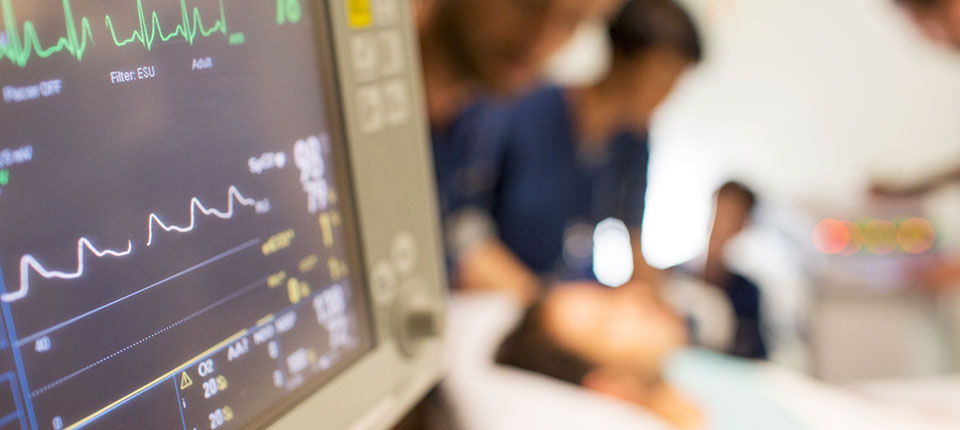
Solving Abnormal Heart Rhythms with The Right Tools
Abbott's fast-growing electrophysiology portfolio helps diagnose and treat heart arrhythmias.
Aug. 28, 2018
- Copy Link
- Share on X
- Share on Facebook
- Share on Linkedin
Our hearts are designed to beat more than 3 billion times or more over our lives. A host of factors can affect the heart's remarkable performance as we age, but Abbott’s latest electrophysiology technologies enable people with arrhythmias to keep doing the things they love.
Electrophysiology – the study of the heart’s electrical performance – addresses the broad spectrum of arrhythmias, or abnormal heart rhythms. As the heart begins to beat too fast or too slow, changes in blood flow can lead to palpitations, dizziness, shortness of breath or fainting.
Abbott has expanded its product offering to take a leadership position in electrophysiology, offering a portfolio of life-changing electrophysiology technologies to equip doctors with the right tools to diagnose problems, map the inside of hearts and deliver the right therapies.
It's also been among the fastest-selling areas of Abbott's broad device portfolio, with electrophysiology growing 22 percent in the second quarter compared to a year earlier. That kind of revenue growth has helped drive Abbott's average organic growth rate above 7 percent for the third consecutive quarter.
Conditions Affect Millions
More than 7 million people in the U.S. have a heart rhythm problem, significantly increasing their risk of stroke and/or heart attack and other risks from potential blood clots. Atrial fibrillation (AF), where the heart's electrical impulses lose coordination and create blood-flow problems, is among the most common conditions that Abbott’s portfolio addresses, in this case with a treatment approach called ablation.
Ablation addresses the abnormal tissue that's disrupting the heart’s normal flow of electrical signals and causing the AF trouble; designing the right catheters to make ablation procedures effective and safe is among the strongest parts of Abbott's electrophysiology lineup as such products help doctors determine which parts of the heart tissue are healthy and which are not. Wall Street has taken notice.
"Abbott's electrophysiology results show why AFib ablation remains one of the most underappreciated growth markets in MedTech, in our view," wrote Christopher Pasquale of Guggenheim Securities in a note to investors about Abbott's second quarter results. His firm estimates the broader electrophysiology market is growing 16 percent on a global basis, confirming Abbott’s leadership in another fast-growing medical technology area.
Before the invention of mapping technology like Abbott's, if a patient had multiple arrhythmias it proved difficult to diagnose. Today a combination of catheters and sensors helps identify problem areas inside the heart and treat them to restore regular electrical functions. Abbott’s products work together in multiple ways to solve these problems.
The EnSite Precision Cardiac Mapping System provides a crucial tool for successful ablation procedures because of its diagnostic capability to map the heart’s electrical signals. The EnSite Precision mapping system is designed to create faster and more accurate highly-detailed maps of the heart which helps speed up mapping time during ablation procedures. Similarly, Abbott’s Advisor HD Grid Mapping Catheter, Sensor Enabled product complements the EnSite system to provide three-dimensional heart views; in May, the U.S. Food and Drug Administration approved Advisor and added another tool for doctors.
A Portfolio of Solutions
Abbott has an array of other catheters physicians can use during ablation procedures. One of Abbott's new ablation technologies is the TactiCath Quartz Contact Force Ablation Catheter which also integrates with the EnSite Precision system. The sensor-enabled version of TactiCath Contact Force Ablation Catheter is approved in Europe and awaits U.S. regulatory approval. The integrated system also helps physicians determine where to apply optimal contact force (pressure) when creating a lesion during a cardiac ablation.
While these latest catheters and mapping systems are helping Abbott’s ablation market expand, advances in remote heart monitoring are also a big part of the electrophysiology landscape. The Confirm Rx implantable cardiac monitor is the world's only smartphone-compatible insertable cardiac monitor designed to allow physicians to remotely monitor cardiac arrhythmias, and has seen strong demand since being approved by the U.S. FDA in October 2017.
The small Confirm Rx device is implanted just under the skin with a minimally-invasive outpatient procedure and enables patients to stay connected with their healthcare providers. The device not only automatically records arrhythmias that occur, it also allows patients to record and transmit data captured by their Confirm Rx device from their smartphones when they experience symptoms. Doctors can analyze and use this data to help provide the best diagnosis and treatment options possible to patients.
Guggenheim's research notes that the Confirm Rx line has already captured 18 percent of the insertable cardiac device market in just two quarters of being on the market. Just as with the broader Abbott electrophysiology portfolio, it’s a product for investors to watch as its adoption grows.
For the latest on Abbott’s life-changing technology, get updates directly in your inbox.